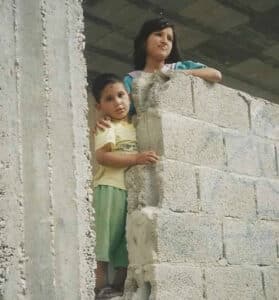
Facing Grief
My first experiences of intense grief were borrowed: I watched as others grieved, children and mothers gone too soon; grieved cruelty born from racism; and grieved loss from upheaval and displacement. During my first mission’s trip to the Cheyenne River Sioux community, I was asked to sing for the funeral services of one of their community members who had passed suddenly. After a week of sharing the challenges and limitations of life on a reservation, it was gut-wrenching to watch a different culture wail and mourn in ways I had never witnessed before. While in college, during my time in the West Bank and Gaza – Palestinian Territories separated and areas occupied militarily within the State of Israel – I walked through refugee camps full of people who had been mourning for decades of loss. I was shaken and angry, full of borrowed grief. I didn’t know what to do with it and returned to the US with rage and hopelessness.
A year later, I watched the towers fall in NYC; and shortly after that, I found out that my parents had lost all of their savings and were no longer my financial safety net. And then there was my miscarriage at the first glimmer of starting our family – grief had become personal.
I’m not sure how grief has found you. Were you young? Were you blindsided and buried in it? Are you still experiencing waves of grief and disillusionment for the loss you’ve experienced?
Thanks to the work of psychiatrist, Elisabeth Kübler-Ross, our modern understanding of grief has been connected to five stages: denial, anger, bargaining, depression, and acceptance. We see elements of these stages in our scriptures this week.
In Lamentations 5, we are given access to a prayer written in response to the fall of Jerusalem.
1 Remember, Lord, what has happened to us;
look, and see our disgrace.
2 Our inheritance has been turned over to strangers,
our homes to foreigners.
3 We have become fatherless,
our mothers are widows.
4 We must buy the water we drink;
our wood can be had only at a price.
5 Those who pursue us are at our heels;
we are weary and find no rest.
6 We submitted to Egypt and Assyria
to get enough bread.
7 Our ancestors sinned and are no more,
and we bear their punishment.
8 Slaves rule over us,
and there is no one to free us from their hands.
9 We get our bread at the risk of our lives
because of the sword in the desert.
10 Our skin is hot as an oven,
feverish from hunger.
11 Women have been violated in Zion,
and virgins in the towns of Judah.
12 Princes have been hung up by their hands;
elders are shown no respect.
13 Young men toil at the millstones;
boys stagger under loads of wood.
14 The elders are gone from the city gate;
the young men have stopped their music.
15 Joy is gone from our hearts;
our dancing has turned to mourning.
16 The crown has fallen from our head.
Woe to us, for we have sinned!
17 Because of this our hearts are faint,
because of these things our eyes grow dim
18 for Mount Zion, which lies desolate,
with jackals prowling over it.19 You, Lord, reign forever;
your throne endures from generation to generation.
20 Why do you always forget us?
Why do you forsake us so long?
21 Restore us to yourself, Lord, that we may return;
renew our days as of old
22 unless you have utterly rejected us
and are angry with us beyond measure. Lamentations 5 (NIV)
The non-linear stages of grief roll throughout the lament as God is alerted, accused, revered, and petitioned. The people are longing for their old way of life. The reality of their sorrow is specific but also echoes the types of laments we may have today in our own struggles.
In reflection on the stages of grief, we are also given a specific call to action. Through our denial, we are given an invitation to be honest with ourselves and with God about our grief. In the complexity of anger and outrage, we are given the opportunity to repent for ourselves and our community. While we wrestle with the bargaining and longing for a better outcome; our prayers and petitions are welcomed and encouraged. In the places of depression and sorrow we are given glimpses of hope.
This week, recall a season of grief and think back on your honesty, repentance, petition, and hope. Perhaps you could write your own lament and explore your stages of grief.
by Kris Thulson

